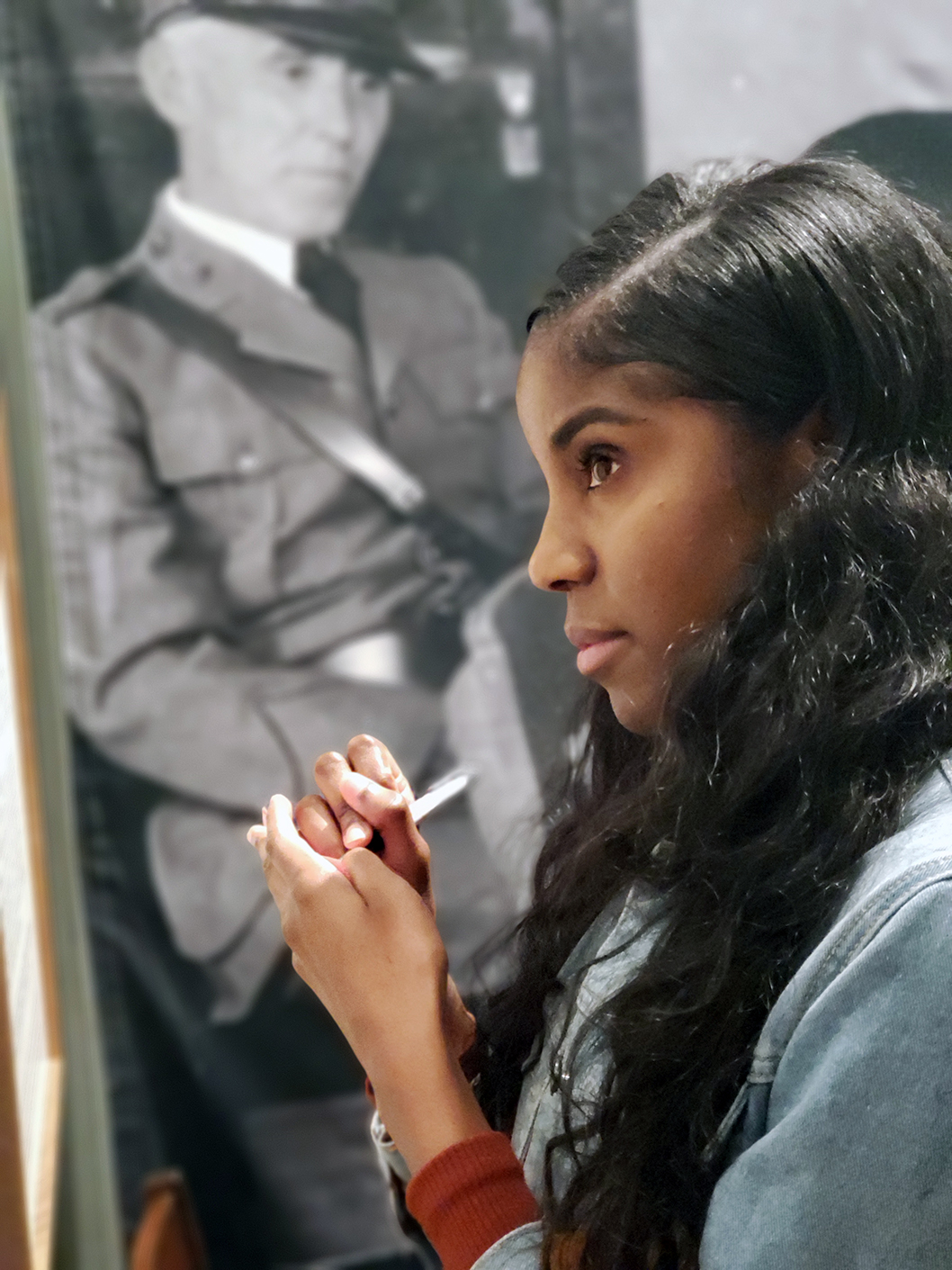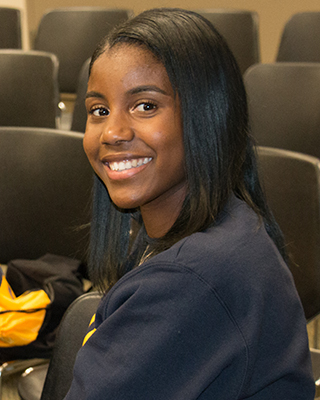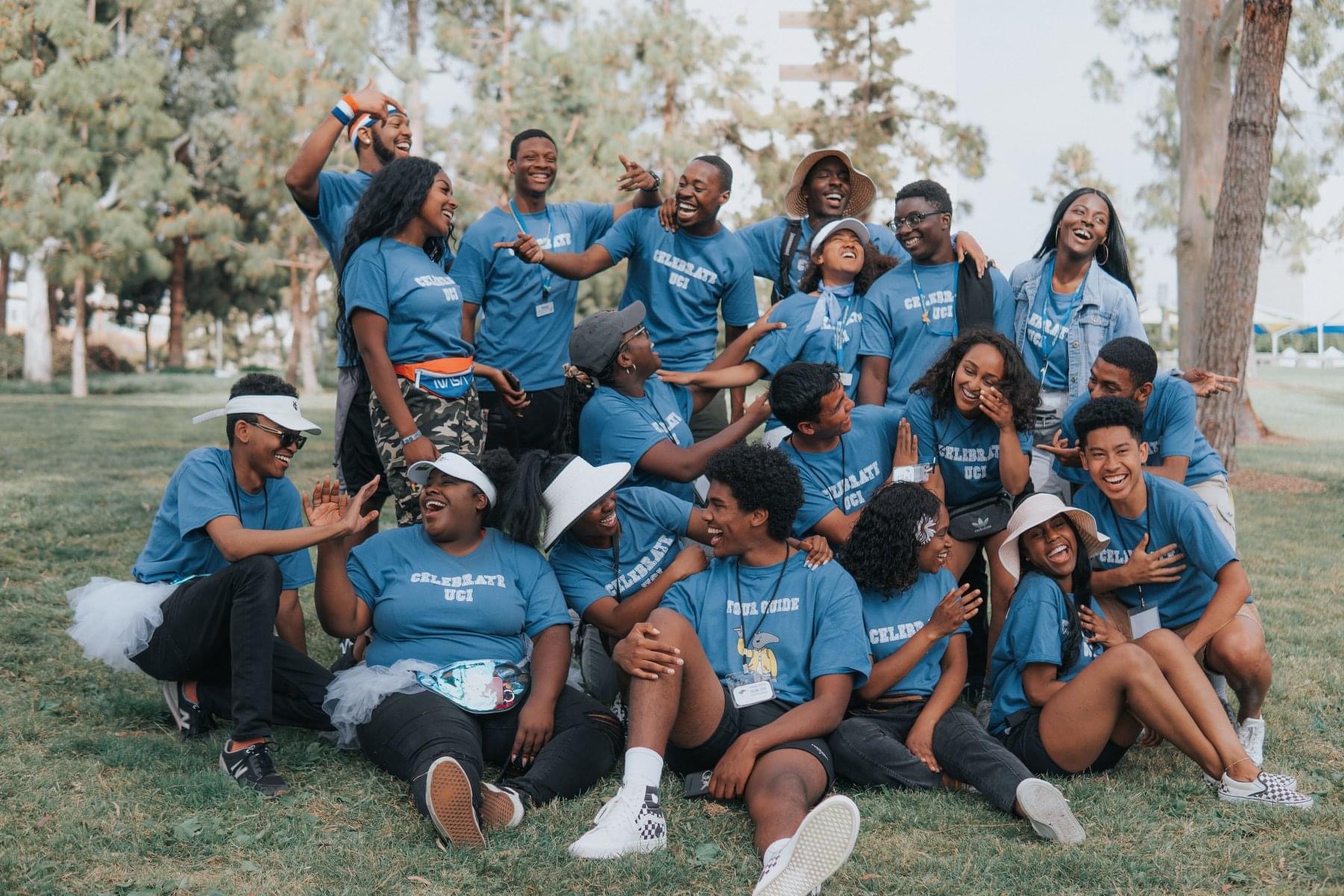FINDING HER FIT
Ta’Myrah Hudson, first-generation Anteater, shares the importance of creating community and campus involvement opportunities to help Black students thrive at UCI

Ta’Myrah Hudson takes notes on her pre-pandemic crosscountry trip with the Deconstructing
Diversity Initiative.
Understanding the collegiate experience of UCI’s Black student population is a topic that’s both professional and personal for Ta’Myrah Hudson. The first-generation Anteater has devoted her time on campus to research, coursework and programs aimed at identifying and breaking down racial and social barriers. The work has given voice to her own experience as a Black student who spent her freshman year feeling isolated and disengaged—like she didn’t fit in at the very place she had worked so hard to attend. Her story changed when she created a community through her campus involvement activities—a network that would serve as both resource and respite throughout her undergraduate experience. Now a senior graduating with degrees in political science and criminology, law and society, three formal research projects completed and countless diversity-focused engagement opportunities under her belt, she’s using her newfound voice to pave a better pathway for others.
Going back to the beginning
Hudson is the first person in her family to go to college. News of her acceptance
to UCI was met with a lot of excitement – and more than a few nerves. “My parents
and siblings were all super excited and encouraging about my decision, but they didn’t
have knowledge of the system and weren’t a resource I could turn to about how to actually
do college,” she says. “When I started at UCI, I wasn’t really sure how to navigate
campus beyond my classes. I started to feel like I didn’t belong or that I wasn’t
good enough to be here.”
Research shows that these feelings of selfdoubt when in an unfamiliar system—called imposter syndrome—are more common among first-generation and minority students. “First-generation and students of color are navigating a system built on privilege filled with financial challenges, psychological and academic adjustments. They do this while balancing home, school and the heavy weight of family responsibilities against the realization that their degrees will help their families and ensure the dream of a better tomorrow,” says social sciences associate dean Jeanett Castellanos who would become one of Hudson’s close mentors. “That’s a pretty heavy load for a new student to bear alone.”
Absent a close family collegiate support system on which to lean, Hudson determined early on that she would need to create her own. To start, she went back to what ignited her initial interest in UCI: her first campus visit as a newly accepted Anteater. The trip was part of Inspiring & Reassuring Individual Student Excellence (iRISE), a two-day event hosted by UCI’s Black Student Union (BSU) aimed at connecting prospective Black students and their families with each other, the campus and its many resources.
Ta’Myrah Hudson and her fellow campus reps at the annual Celebrate UCI event.
“The event was really influential in my decision to choose UCI,” she says. “I met other Black students and heard from prominent Black speakers and administrators on campus,” she says. “I loved the energy and sense of community I felt among the people I met—specifically the student representatives—and that was something I was looking for.”
She connected with BSU and immediately grew her academic and peer network. She applied and was accepted into a student worker role as a campus representative with the Office of Admissions, which now hosts iRISE as the Black Family Celebration. From leading campus tours to facilitating orientation discussions, she became part of a network that gave her a purpose in finding and sharing valuable campus knowledge about student programs and spaces – particularly those for Black and under-represented students at UCI.
She’s oftentimes the first face many new and prospective Anteaters see when they come to campus, and she knows how much that first experience matters.
“I make sure to talk about the importance of getting involved and creating your own community by sharing my story,” she says. “I want students to know they don’t have to have all the answers when they come here. UCI is full of people who are here to help, and programs that can help put voice to your experience, when you know where to look.”
Pinpointing important programs and people
BSU was one of those critical resources for Hudson – particularly this past year during
COVID as members turned to the group’s WeChat for community and connection. She’s
made a point of reaching out and mentoring new Black students to help establish their
support community early on.
She also got involved in the Deconstructing Diversity Initiative and Diversity, Inclusion and Racial Healing Ambassadors, two social sciences outreach programs led by Teresa Neighbors that further fueled Hudson’s growing interest in racial and social justice. Student ambassadors in both groups work to reduce prejudice by creating a deeper understanding of race issues central to society.
“Each week in DDI, we learned about a range of different social issues and the histories behind them, like redlining, environmental racism and allyship,” she says. Her learning continued as she traveled with her cohort to sites around the country – Chicago, Washington, D.C., Atlanta, Montgomery and New Orleans – that have strong ties to the experience of race in America.
“It was an incredible experience. We got to meet with different organizations and community leaders who were doing amazing social justice work as organizers in their communities,” she says. “I really liked that there was also a big emphasis on mental health, as this type of work can get really draining. We learned how to still make sure we were taking care of ourselves in the process and, whenever we could, we would hold space for reflection and healing circles.”
Get involved and find your space on campus – one that gives you a sense of belonging. It’s the groups you join and the people you meet that make you feel a part of the campus, that define your community.
Back on campus, Hudson put what she learned in DDI to use as a mentor with DIRHA where she helped facilitate weekly discussions with local high school student groups on topics surrounding race, gender and religion. The students then developed diversity-focused projects to implement within their high schools.
In both programs, Hudson showed an innate ability to engage in difficult conversations while making others feel heard, says Neighbors.
“Ta’Myrah is one of those students who inspires her instructors and directors with her passion for racial equity and justice and her persistence in the face of difficult situations and course content. Confident, perceptive and sensitive to differing viewpoints, she engages critically on difficult topics of race and equity, generously sharing her personal experiences while acknowledging the experiences of others,” says Neighbors. “As a mentor, she gives thoughtful feedback that is well received by her mentees who quickly come to trust and respect her. Ta’Myrah is a true joy to work with and an exceptional role model and leader among her peers.”

Understanding the role of research
Neighbors encouraged Hudson to apply to the social sciences’ Summer Academic Enrichment
Program to further develop what she was learning into actionable research. The five-week
residential program aimed primarily at first-gen students focuses heavily on research
methods, statistics and communications to prepare participants for graduate school.
And it boasts a high success rate; more than two-thirds of SAEP’s 500+ alumni have
gone on to graduate school.
In all of her university experiences, conducting academic research was probably the most foreign, says Hudson, echoing a familiar feeling among many of the program’s firstgen students.
“Research is an unfamiliar university activity for many first-gen students; some even question the relevance of such practice,” says Castellanos. “As educators, we recognize the importance of shaping and cultivating firstgen students’ scholar identities; as mentors, we help connect the practice of research to communities and social issues. Once students personally connect with the material, they thrive as undergraduate researchers.”
This was particularly true for Hudson, who has since taken on three projects. Her first, guided via SAEP, focused on discrimination in mental health. She then teamed up with Castellanos to tackle projects on how Black first-generation college students adjust to college, and factors that help and hinder Black—particularly female—students’ adjustments to university life. The latter is currently being worked into a manuscript full of best practices university administrators can enact to positively impact the campus experience of Black students across the nation.
“Ta’Myrah is a committed activist scholar who’s invested in both developing her research skills and understanding the importance of scholarship and counter narratives in research,” says Castellanos.
One of their key findings highlights the importance of communal living programs—like the campus’s Rosa Parks House and Academic Excellence Black Scholars House—in helping Black students feel connected at UCI. Hudson makes a point to share these and other helpful tips with each of her campus tour groups and mentees, including her younger siblings.
Being prepared – and open – for everything
Hudson had big plans for finishing out her senior year off campus in experiential
learning opportunities. She was accepted and approved to study abroad in London and
attend the UCDC program in Washington, D.C., but COVID-related closures threw a major
wrench into everything travel-related. Disappointed but not deterred, she shifted
gears. Her off-campus experience changed to a year of online learning spent hunkered
down with her roommates in their shared apartment, leaning on each other for support.
“It’s been difficult and draining doing my last year on Zoom and missing out on activities that I had wanted to do in person, but we’ve made it through and I think that’s something my graduating class needs to remember in all of this,” she says. “We finished our degrees during a period in our history that no one was equipped to take on. And that’s a big deal – something we all need to recognize and give ourselves credit for.”
With commencement in sight, the future for Hudson is bright. She’s applying for shortterm work opportunities in D.C. while studying for the LSAT with plans for law school in 2023. And she needn’t look far to see the pathway she’s paved working for others: her mentees at UCI are thriving, her brother is now a sophomore at Sacramento State and her sister, a middle school student, already plans to follow in Ta’Myrah’s collegiate footsteps. Her advice as they make their way?
“Get involved and find your space on campus—one that gives you a sense of belonging. It’s the groups you join and the people you meet that make you feel a part of the campus, that define your community.”



connect with us: